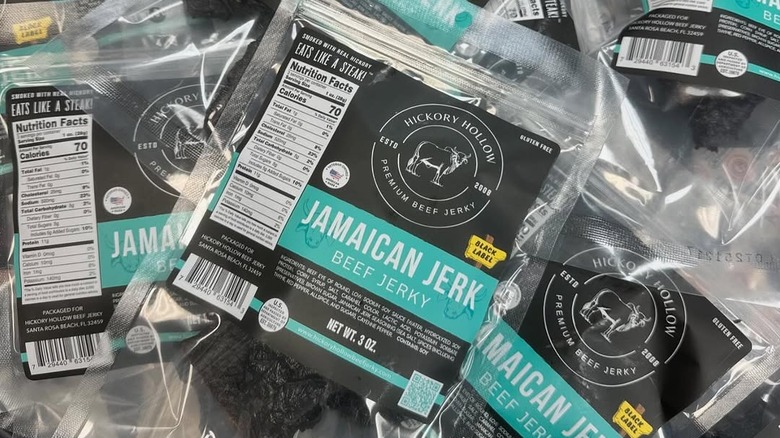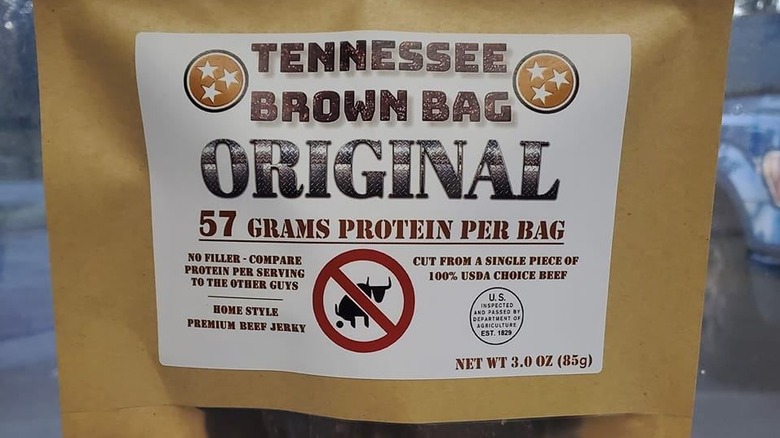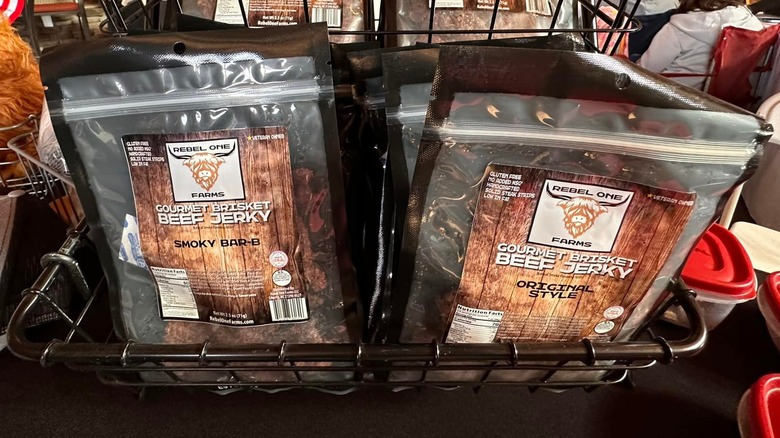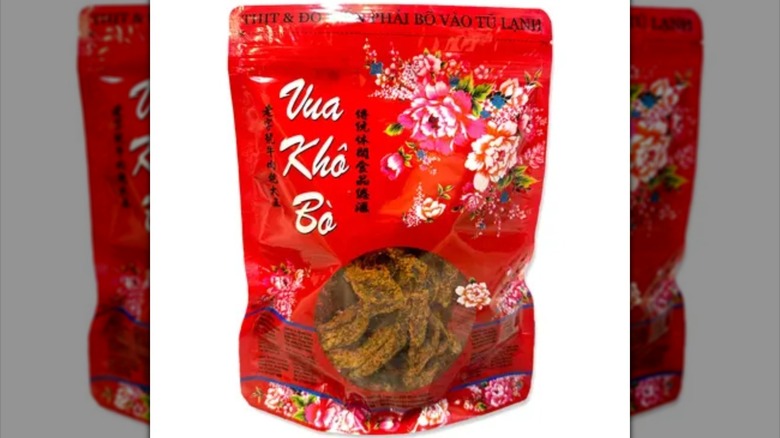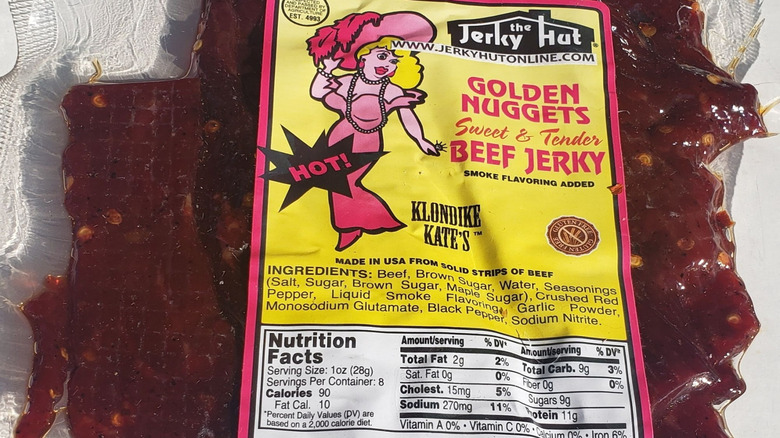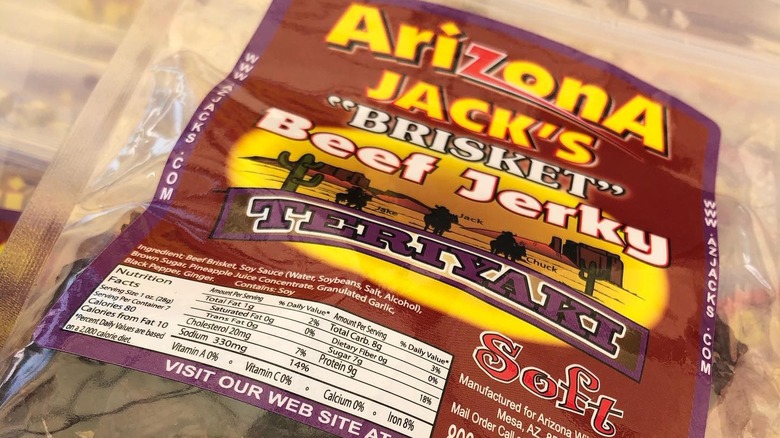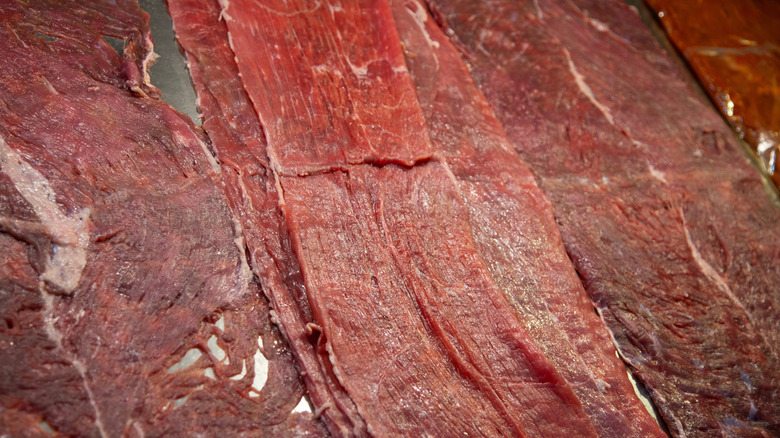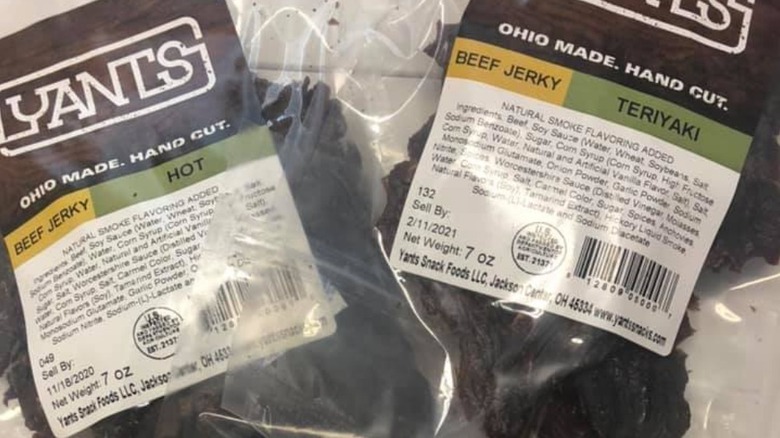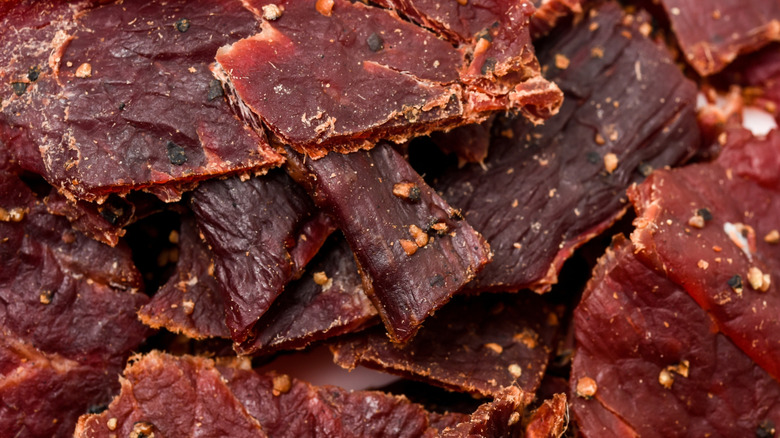The Biggest Jerky Recalls In US History
While it's a staple snack for many people today, jerky is far from new. In fact, the meaty snack has had a long history. Some historians believe that humans have been eating dried meat since the days of the Inca Empire (back then, it wasn't called jerky, but "ch'arki"). Others claim the meat snack was a Native American invention. But either way, over the centuries, we went from eating plain dried meat for sustenance to eating the jerky we know today — basically sticks of meat flavored with everything from teriyaki to barbecue in plastic packaging. Today, the jerky industry is huge (like nearly $6 billion huge) and can be made from everything, from beef to bison to elk to ostrich to mushrooms.
But while most types of jerky are protein-packed, there are a few things to consider before you start scoffing down this popular meaty snack. Like all foods, jerky can be caught up in major recalls for many different reasons. Sometimes, jerky is recalled because it contains undeclared allergens, like soy or fish, and other times, it's a foodborne bacteria risk. On rare occasions, jerky has even been recalled because it was produced in a rodent-infested facility — sadly, we're not joking. Intrigued? Keep reading for more details on some of the biggest jerky recalls ever in the United States.
Hickory Hollow Jerky recalled more than 6,200 pounds of jerky due to lack of federal inspection (2024)
In 2024, Alabama brand Hickory Hollow Jerky recalled more than 6,200 pounds of jerky products — including its Jamaican Jerked Beef Jerky, its Sweet Heat BBQ Beef Jerky, its Honey Mustard Bacon Jerky, and its Honey Original Beef Jerky — because they had been produced and distributed without being inspected first. It is a legal requirement that all meat and poultry products are inspected before they are sold across the U.S. Jerky is, of course, a meat product, so it should always be inspected before distribution. This helps to keep the food system safe, by ensuring that food processing facilities are clean and hygienic. If they're not, this can increase the risk of harmful foodborne bacteria entering the food system and making people sick.
In Hickory Hollow Jerky's case, the FSIS discovered that the brand had been selling products without inspection under the supervision of two different owners. The branding and appearance of the jerky had remained the same throughout this time. Luckily, there were no reports of sickness associated with the uninspected jerky, which at the time of the recall, had been shipped to retailers not just in Alabama, but also Georgia, Florida, North Carolina, and Oklahoma. The jerky had also been sold to customers online through the Hickory Hollow Jerky website. As a precaution, anyone who had purchased the jerky was urged to throw it away or return it to the store for a refund.
Tennessee Brown Bag recalled more than 4,500 pounds of beef jerky because they weren't inspected (2022)
Hickory Hollow Jerky is far from the only brand to be in hot water due to a lack of federal inspection. In 2022, two years before the Alabama brand's recall, Tennessee Brown Bag had to pull more than 4,500 pounds of its beef jerky off the shelves for the same reason. The products implicated in the recall included Tennessee Brown Bag Original, Tennessee Brown Bag Peppered, Tennessee Brown Bag Dill Pickle, and Tennessee Brown Bag Spicy.
Again, at the time of the recall, the products had already been sold online via the brand's website. They had also been shipped to retailers in Tennessee, as well as Alabama, Virginia, South Carolina, and Georgia. It was the Tennessee Department of Agriculture that first picked up the issue and reported it directly to the FSIS. Fortunately, despite the lack of inspection, there were no reports of foodborne bacteria in the jerky products.
To be on the safe side, the FSIS urged anyone who had already bought jerky from Tennessee Brown Bag, and had not yet consumed it, to throw it away or return it to the store for a refund. This is because, like most products, jerky can harbor many different types of potentially dangerous bacteria, including listeria and E. coli, if it is produced in unhygienic conditions.
Boyd Specialties recalled more than 1,600 pounds of jerky due to listeria concerns (2022)
When products are pulled from the shelves due to a lack of inspection, this is usually due to the threat of potential bacteria, rather than any actual bacteria being discovered. However, in some cases, jerky is recalled because dangerous pathogens have actually been found. This was the case in 2022, when California brand Boyd Specialties had to pull more than 1,600 pounds of jerky off the shelves of retailers in eight states. Routine testing from FSIS had uncovered listeria bacteria lurking in Boyd Specialties products. The recalled items were sold under a number of brand names. They included Rebel One Farms' Gourmet Brisket Beef Jerky Straight Whiskey, Killer Chill Vibes Carne Asada, Genie Gourmet Brisket Beef Jerky Teriyaki, and many more.
If consumed, listeria can cause listeriosis, a potentially serious and life-threatening illness. For many, listeriosis will not cause any major problems, but for vulnerable individuals, including the very young and the very elderly, it can be fatal. Every year in the U.S., around 1,600 people develop listeriosis. Of them, around 260 people will die as a result of the infection. On top of this, listeriosis can also lead to miscarriages and stillbirths. This is why it is imperative that companies act fast to pull their products off the shelves as soon as listeria is found. Fortunately, in the case of Boyd Specialties, there were no reports of sickness associated with the contamination.
Legacy Food Company recalled more than 67,800 pounds of beef jerky due to misbranding (2021)
Misbranding is another common driver behind food recalls in the U.S. In 2021, California company Legacy Food Company recalled more than 67,800 pounds of beef jerky, including Formosa Brand Hot Peppered Beef Jerky and Vua Kho Bo Hot Beef Jerky, because they were mislabeled. The error meant that sesame oil, a known allergen, was not declared on the label. The FSIS discovered the packaging mistake during an inspection of the company's products. This is another reason that underscores why FSIS inspection is so necessary when it comes to keeping the food system safe.
Sesame is in the top nine allergens in the U.S., which means it should always be declared on food labels, even if the risk of contamination is deemed to be very low. This is because, for some people, even a tiny trace of sesame can lead to an allergic reaction. For some, this will be mild, but others could develop full-blown anaphylaxis, which involves life-threatening symptoms like tongue swelling and difficulty breathing. If not treated promptly, anaphylaxis can be fatal.
Fortunately, there were no reports of anyone having any allergic reactions to the jerky produced by Legacy Food Company. This was lucky, because at the time of the recall, the products had already been sold to consumers online and shipped to retailers across California.
People's Sausage Co recalled more than 13,500 pounds of jerky and meat sticks due to lack of inspection (2018)
Another jerky company was forced to recall its products in 2018 when an FSIS investigation found that it was selling jerky in the U.S. without a grant of inspection. People's Sausage Co, which is based in California, had to recall more than 13,500 pounds of its jerky and meat sticks from stores in Montana as a result of the error. All of the recalled products were produced by bison and elk jerky company Montrail Bison — they included Elk Jerky Lemon Chile, Elk Jerky Teriyaki, Bison Jerky Sweet and Spicy, and Bison Jerky Teriyaki.
Companies cannot sell products like jerky in different states without a grant of inspection from the FSIS. Again, this is to ensure that the food system is safe from foodborne bacteria, but also to ensure that there are no hazards or dangerous practices in the facilities where food is produced for American consumption. It also helps to reduce the risk of packaging mistakes, for example.
There were no issues or health problems associated with the recall. But, again, to be on the safe side, the FSIS urged anyone who had already bought the jerky from Montrail Bison to throw it away or return it to the store they bought it from for a refund. Anyone who was worried about experiencing illness as a result of consuming the recalled products was also encouraged to contact their healthcare provider.
Whiskey Hill Smokehouse recalled more than 22,400 pounds of beef, ostrich, and venison jerky due to undeclared soy (2017)
In 2017, undeclared allergens were behind another jerky recall. This time, Oregon-based Whiskey Hill Smokehouse announced a recall of more than 22,400 pounds of jerky products because the packaging they were contained in did not declare soy. Again, like sesame, soy is one of the main nine allergens in the U.S., and should always be listed on product packaging to reduce the risk of allergic reactions. Other common allergens include milk, eggs, peanuts, tree nuts, wheat, shellfish, and fish. They are not the only foods that Americans are allergic to, but they are thought to account for most of the allergies in the U.S.
A number of brands' products were implicated in the Whiskey Hill Smokehouse recall, including The Jerky Hut's Peppered Golden Nuggets Beef Jerky, Whiskey Hill Smokehouse's Trophy Series Ostrich Jerky, and Mauinui Venison Gourmet Jerky. This particular recall was given Class II status, which means that the FSIS determined the health risk associated with the mislabeled products to be low.
At the time of the recall, all of the affected products had been shipped to retailers across the U.S. Fortunately, there were no reports of allergic reactions associated with the recall. However, anyone who was concerned about the possibility of an allergic reaction was urged to contact their healthcare provider. The FSIS also encouraged consumers not to eat the mislabeled jerky.
Prime Snax Incorporated recalled roughly 90,000 pounds of beef jerky due to an undeclared allergen (2014)
Research suggests that around 0.4% of children in the U.S. are allergic to soy. If a child with a soy allergy consumes soy by accident, they could experience everything from hives to stomach upset to anaphylaxis, which, as mentioned earlier, if not treated quickly, can be fatal. This is why it's a big problem when mislabeled products that contain allergens like soy hit the market — particularly products that are popular with children, like jerky.
Like Whiskey Hill Smokehouse, Utah-based company Prime Snax Incorporated had to act quickly when FSIS inspectors discovered that a number of its jerky products had been mislabeled and did not declare soy as an allergen on the packaging. This was despite the fact they had been processed with soy lecithin, a common food additive that is often added to products as an emulsifier or flavor protector. The processing plant was apparently unaware that it needed to declare the use of soy lecithin on its products.
As a result of the finding, 90,000 pounds of beef jerky products were pulled from the shelves from stores across the U.S. A number of brands, including Arizona Jacks, Desert Star, Southwest Trail, Terrell, and Kettle Creek, were caught up in the recall. Again, it was very fortunate that nobody reported any allergic reactions as a result of consuming the mislabeled products.
Yuak's Specialty Meats recalled 90,000 pounds of meat products, including jerky, due to unsanitary conditions (2013)
Nobody wants to eat any food that may have come into contact with rodents. Not only is it an unpleasant thought, but it's also incredibly unhygienic and potentially dangerous. In fact, rodents, like mice and rats, can spread a number of different diseases, including salmonellosis, leptospirosis (which can lead to meningitis), and rat-bite fever (a very serious disease with flu-like symptoms). These diseases can be spread to people through bites or scratches, but also through contaminated food.
This is why, when rodents were found in one of Yuak's Specialty Meats processing plants by the FSIS during a safety assessment, a recall was immediately issued for a number of meat products that had been manufactured there. Roughly 90,000 pounds of products, including Horned Beef Jerky and Rocky Plains Meats Jerky, were pulled off the shelves in Colorado, Nebraska, New Mexico, Utah, and Wyoming, in a bid to keep people safe from foodborne diseases. At the time of the recall, nobody reported any signs of illness associated with any products produced in the rodent-infested plant.
Yuak's Specialty Meats is not the only company to issue a recall due to rodents. In 2022, nearly a decade after this incident, Canadian companies Bistak Enterprises and Bistak Groceries recalled multiple food products from stores amid fears they had been contaminated by rodent droppings. In this case, the companies were concerned that the rodents could have spread salmonella.
Yants Beef Jerky recalled 6,200 pounds of beef jerky because it contained undeclared fish (2011)
In 2011, Ohio-based brand Yants Beef Jerky failed to label its products correctly, and in doing so, put people at risk of allergic reactions. A number of its jerky products, including Yants Hot Beef Jerky and Yants Southern BBQ Beef Jerky, were made with Worcestershire sauce that contained anchovies, but this was not specified on the label. According to the brand, the error occurred due to a change in ingredient suppliers. As a result, it had to recall around 6,200 pounds of jerky from stores in Ohio and Indiana.
Unlike soy allergies, which are more common in children, finned fish allergies are more common in adults. In fact, between 40% and 60% of fish allergies develop in adulthood. A finned fish allergy is different to a shellfish allergy — sufferers will usually experience a reaction to fish species (like halibut, anchovies, cod, and catfish) only, rather than shrimps or prawns, for example. Again, this is why it's important that all food companies label their products appropriately, and always declare when there may be even a small trace of fish inside.
The problem with the labeling at Yants Beef Jerky was discovered during an FSIS inspection of the brand's products. Fortunately, there were no reports of allergic reactions occurring as a result of the mislabeled jerky.
Bach Cúc Beef Jerky recalled more than 3,800 pounds of teriyaki beef jerky due to undeclared wheat (2010)
Wheat is another common allergen in the U.S., and again, it seems to affect adults more than it does children. In fact, up to 1.2% of American adults have an allergy to wheat, while around 0.5% of children have the same allergy. On top of this, wheat is also a trigger for celiac disease, an autoimmune condition that affects around one in 133 people in the U.S. Accurate food labeling helps to keep all of these people safe from adverse reactions, but as you now know from reading this list, sometimes, mistakes are made when products are manufactured and processed.
In 2011, California brand Bach Cúc Beef Jerky recalled more than 3,800 pounds of its Teriyaki Beef Jerky as it contained wheat that was not properly listed on the product label. At the time of the recall, the jerky had already been sent to retailers across the U.S. As with most allergen-related recalls, it was given a low Class II status. Class I status is often reserved for incidents where the FSIS determines there is a reasonable chance that the product could lead to serious health consequences or fatalities. Luckily, nobody fell ill or had an allergic reaction from consuming any of the recalled Bach Cúc Beef Jerky products.

